Search Engine Optimization (SEO) is a business imperative for most businesses looking to improve their online presence and organic traffic. When there are hundreds of SEO tools, the choice of the right one can be the game-changer for your marketing strategy. Here are the top 17 SEO tools that feature various functionalities addressing key areas such as keyword research, backlink analysis, site audits, rank tracking, and competitor analysis.
The most powerful ones like Ahrefs and SEMrush to more user-friendly tools such as Ubersuggest and Yoast SEO suit the requirements of beginners as well as professionals. They are of great importance to businesses that find opportunities, resolve issues, and further improve their strategy for enhanced visibility. The following article details the top 17 SEO tools along with features and benefits they bring to improve SEO operations efficiently.
What is SEO?
SEO is the optimization of a website or online content to rank higher in SERPs. The main objective of SEO is to generate organic, unpaid traffic to a 4p by increasing its ranking for relevant search queries. This involves optimizing web content with targeted keywords, fast loading of a website, friendliness to mobile devices, acquisition of quality backlinks, and enhancing UX. SEO aims at aligning website content and structure with search engines’ algorithms to raise the chances of a website featuring higher results for relevant searches.
List of 17 Best SEO Tools
1. SearchAtlas

SearchAtlas is an all-in-one SEO platform designed to streamline keyword research, content optimization, and competitive analysis in one intuitive dashboard. It combines powerful tools for discovering high-performing keywords with detailed content briefs that guide optimization strategies. The platform excels at identifying content gaps, tracking keyword rankings across search engines, and providing actionable insights to improve SERP visibility.
SearchAtlas stands out for its data-driven approach to SEO, leveraging advanced algorithms to analyze competitor strategies and reveal untapped keyword opportunities. With its integrated content optimization features, businesses can create SEO-friendly content that ranks higher and drives more organic traffic. Whether you’re a beginner looking to understand keyword difficulty or an agency managing multiple campaigns, SearchAtlas offers the flexibility and power needed to achieve measurable results.
Features:
- Advanced keyword research with competitor analysis.
- Content optimization with AI-powered recommendations.
- Rank tracking for comprehensive keyword monitoring.
- Content brief generation based on SERP analysis.
- Backlink analysis and opportunity identification.
- Custom dashboards and automated reporting.
Pros:
- Intuitive interface suitable for all skill levels.
- Comprehensive all-in-one solution reducing tool bloat.
- Strong focus on content-driven SEO strategy.
Cons:
- Premium pricing for enterprise-level features.
- Learning curve for advanced functionalities.
Prices:
- Starts at $99/month
2. Google Analytics
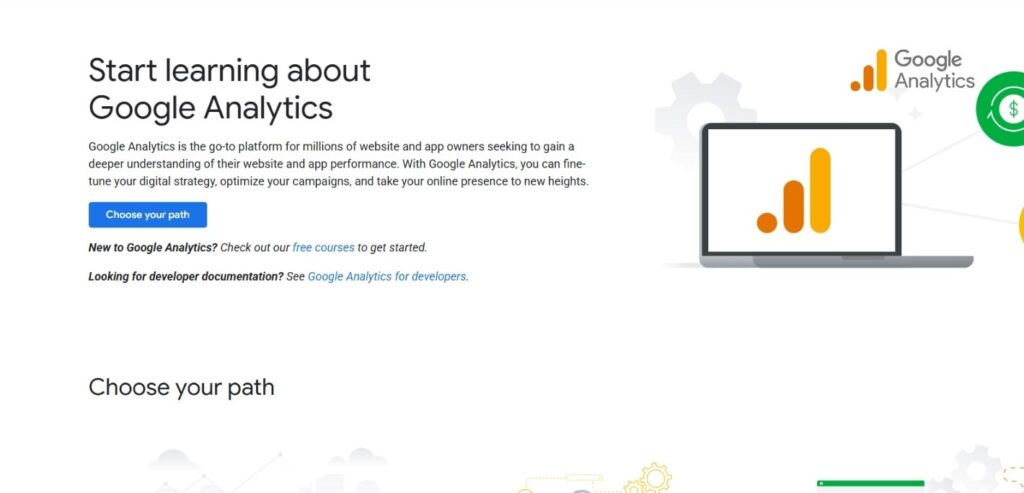
Google Analytics is a free tool from Google for tracking and analyzing the website traffic of its owners. It offers a very detailed report about metrics like page views, bounce rates, user demographics, acquisition channels, and conversions. This platform also comes with great features like goal tracking, event tracking, and real-time data that enable businesses to understand their audience and adjust marketing strategies to improve.
Google Analytics integrates well with other Google tools, such as Google Ads and Google Search Console. Although it is a very important tool for data-driven decision-making, beginners may find it too complex to navigate and interpret advanced data.
Features:
Pros:
Cons:
Prices:
3. Ahrefs

Ahrefs is one of the popular, all-in-one SEO tool sets that provide powerful backlink analysis and competitor research skills. It helps businesses track keyword rankings, audit websites for SEO issues, and analyze competitors’ strategies by gaining a deeper view into how backlinks, site authority, and organic traffic move with its link index of millions.
The Ahrefs keyword research tool can reveal high-traffic keywords, and its site audit tool quickly identifies technical issues with SEO. Although it is known for accuracy and comprehensive data, it can be expensive, making it ideal for agencies or larger businesses rather than small enterprises.
Features:
Pros:
Cons:
Prices:
4. PRNEWS.IO

PRNEWS.IO is a specialized platform focused on content marketing and press release distribution, helping brands boost their SEO through high-authority media placements. It allows businesses to publish sponsored content and news articles on a vast network of trusted media outlets worldwide—making it a powerful tool for building backlinks, enhancing online visibility, and improving domain authority.
Whether you’re launching a product, building a brand reputation, or aiming to strengthen your off-page SEO, PRNEWS.IO streamlines the outreach process. With its transparent pricing, easy-to-use interface, and broad media database, users can quickly filter by country, language, or domain authority to find the perfect publication for their content.
Features:
- Access to thousands of global news sites and blogs for content placement.
- Filter options based on niche, region, SEO metrics, and more.
- Guaranteed publication with fixed pricing—no pitching required.
- Built-in metrics like Domain Authority and audience reach.
Pros:
- Saves time on manual outreach.
- Helps generate high-quality backlinks.
- Transparent, fixed pricing with no hidden fees.
Cons:
- Limited content customization in some media partnerships.
Prices:
- Starts at $6/publication, depending on the site and region.
5. SEMrush
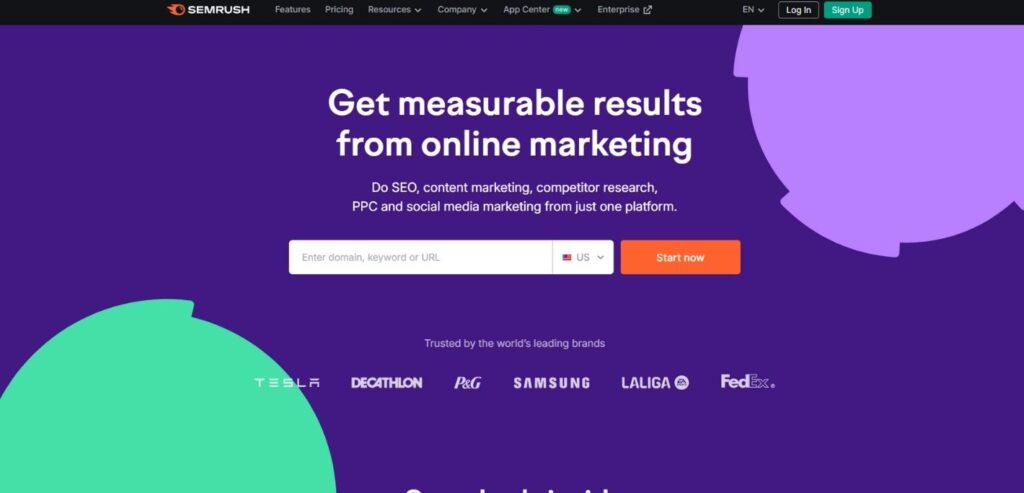
SEMrush is a strong platform for digital marketing, with a variety of tools for SEO, content marketing, PPC, and social media. SEMrush provides extensive competitor analysis, keyword research, site audits, and backlink tracking. It is therefore a very common tool among SEO professionals.
In addition, it has tools for keyword rank tracking, recommendations for optimizing content, and tools for monitoring and enhancing online campaigns. SEMrush is particularly popular for its keyword research features and ability to track organic and paid search performance. However, its pricing can be high, which may not be ideal for small businesses or individuals starting in SEO.
Features:
- Keyword research and a keyword rank checker.
- Competitor analysis and traffic insights.
- On-page SEO audits and recommendations.
- Backlink tracking and analysis.
- Content marketing and topic research tools.
Pros:
- Wide range of tools in one platform.
- Excellent for competitor research.
Cons:
Prices:
6. Moz Pro
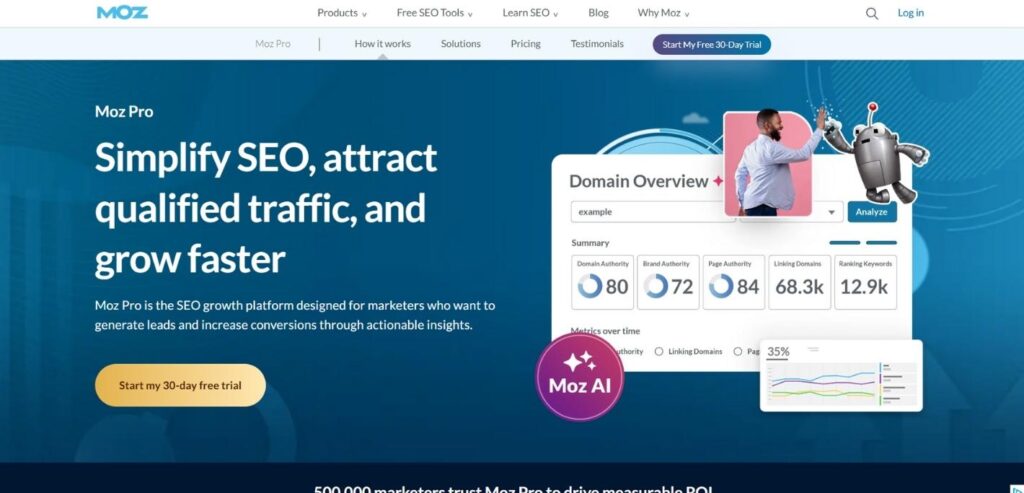
Moz Pro offers everything that will go into research from keyword optimization to site audit and backlink analysis and even rank tracking. With the toolset, businesses would become more apparent online and will eventually optimize content as well. Its interface is pretty intuitive even to a greenhorn and a seasoned one too.
The platform offers comprehensive link analyses besides a crawling facility of your sites that help identify technical SEO problems. Moz Pro’s keyword difficulty and opportunity analysis can be used to discover high-potential SEO keywords. It does not offer some of the depth and advanced features available in competitors such as Ahrefs, nor is it inexpensive enough for small businesses.
Features:
Pros:
Cons:
Prices:
7. Ubersuggest
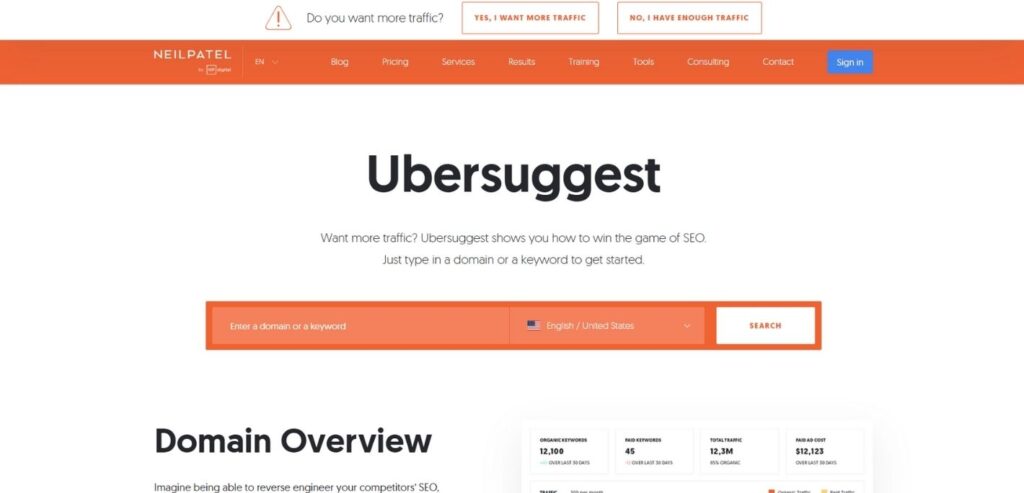
Ubersuggest is an SEO tool that tries to make keyword research and content optimization easier. Neil Patel developed it, and it offers features like keyword idea discovery, search ranking tracking, and site audit.
Ubersuggest has helped identify long-tail keywords with low competition, which makes it perfect for small businesses and new starters, along with backlink analysis, domain insights, and suggestions to improve on-page SEO. While Ubersuggest is cheap and easy to use, its data can be less detailed than premium tools like SEMrush or Ahrefs, and it’s also limited in features for large-scale businesses.
Features:
Pros:
Cons:
Prices:
8. Screaming Frog SEO Spider
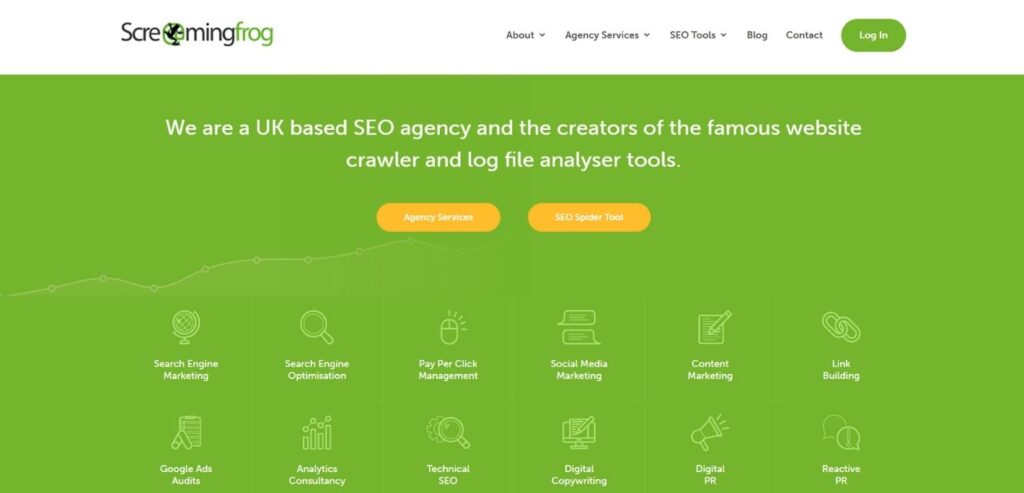
Screaming Frog SEO Spider is a web crawler and auditing tool for an SEO professional to identify issues of broken links, duplicate content, or missing metadata. It provides information on technical SEO and website structures through in-depth crawl reports
It assists in analyzing metadata, internal linking, and even the structures of URLs themselves in improving site architecture. The tool is very efficient but the interface might be confusing to a new user, and it only allows the free version with a crawling capacity.
Features:
Pros:
Cons:
Prices:
9. Google Search Console
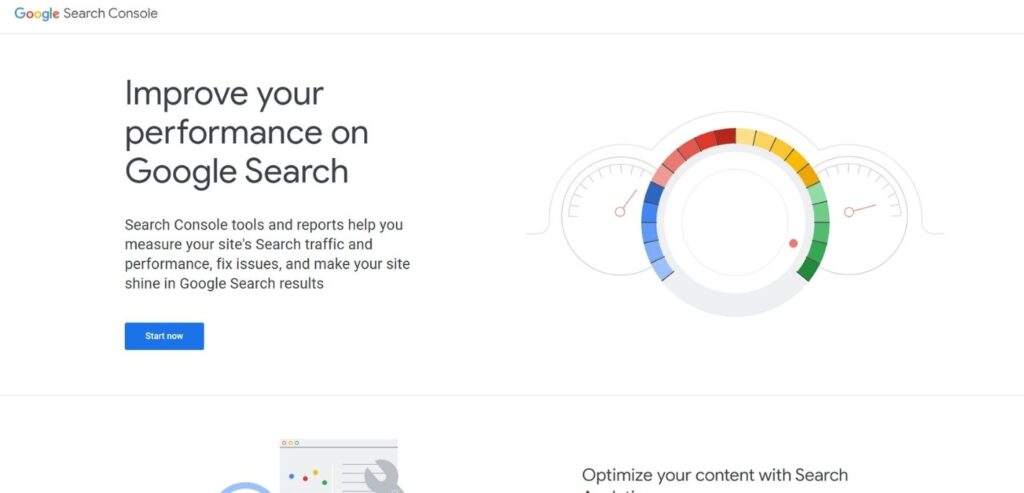
Google Search Console is a free service from Google that enables website owners to monitor, maintain, and improve the presence of their site in Google’s search results. It provides information about how a website performs, whether it has been indexed, and what searches are driving traffic.
With features such as submitting sitemaps, monitoring mobile usability, and identifying crawl errors, it helps businesses optimize their website for Google Search. However, Google Search Console focuses mainly on Google search data and may not provide insights for other search engines. It can also be difficult for beginners to interpret the data effectively.
Features:
Pros:
Cons:
Prices:
10. Yoast SEO
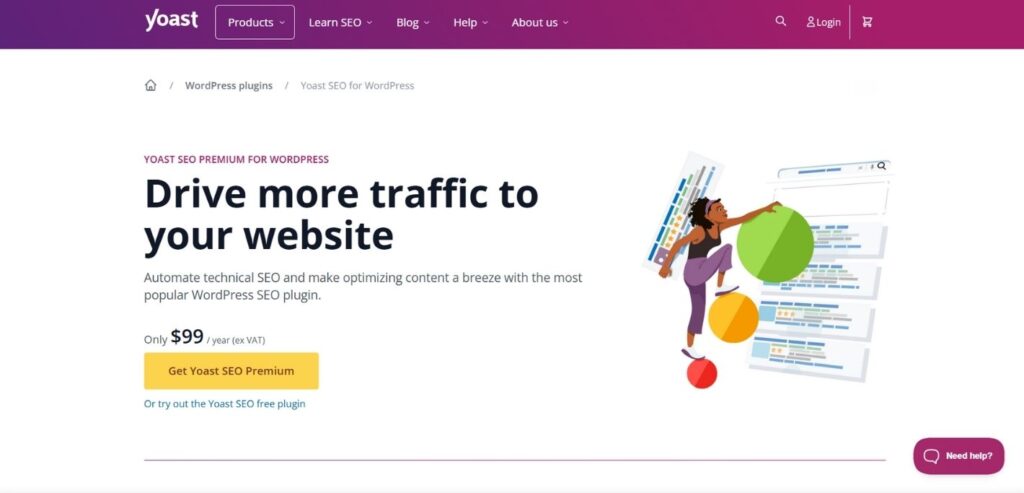
Yoast SEO is one of the most sought-after WordPress plugins that can aid in search-engine optimization and guides one on how to further optimize the content with recommendations on titles, meta descriptions, and content for better rank potential.
Readability analysis is also added to improve structure or arrange content for a better user experience. Sitemaps are automatically created by Yoast, preventing the problem of duplicate content by enabling a canonical URL. Though very user-friendly, its features are more limited in the free version, and it may slow down website performance if not optimized properly.
Features:
Pros:
Cons:
Prices:
11. KWFinder
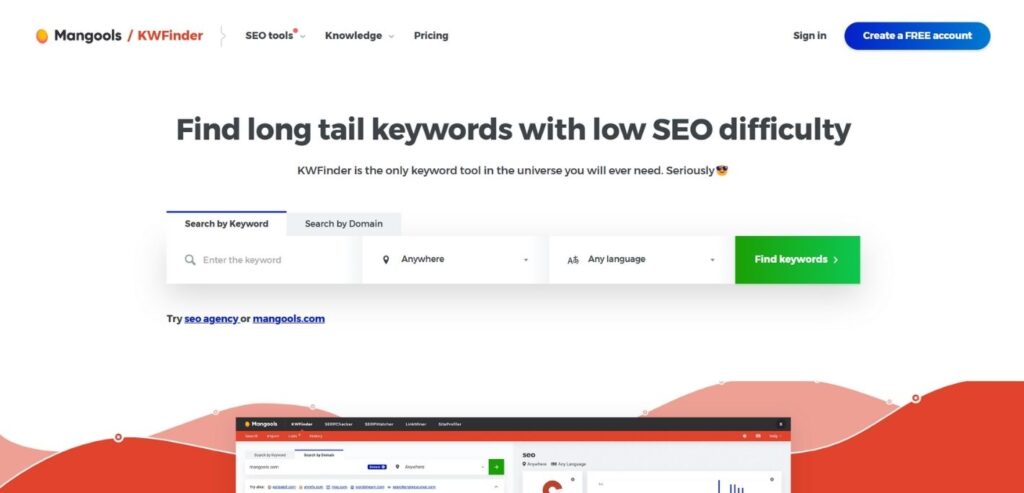
KWFinder is a keyword research tool that provides help for businesses finding long-tail keywords with lower competition and more significant search volumes. It informs on keyword difficulty, trends, and search volume and thus becomes valuable to content creators and SEO experts.
KWFinder further offers users the possibility to review their competitors’ keyword strategies and explore opportunities to use the right keyword. While it’s cheap and straightforward to use, the tool can’t compare in data completeness compared to the major tools like SEMrush and Ahrefs; the free plan is pretty meager on the features.
Features:
Pros:
Cons:
Prices:
12. AnswerThePublic
AnswerThePublic is a keyword research tool that creates a visual representation of search queries in relation to a particular keyword. It shows the questions, prepositions, and comparisons that are searched by people, which can be very useful for content creators when generating topics.
The tool is excellent for brainstorming content ideas based on real user queries, ensuring content aligns well with search intent. Although it offers a unique and visual manner for keyword research, it provides very limited keyword data and features with its free version. Its search volume estimates are not as detailed as other tools.
Features:
Pros:
Cons:
Prices:
13. Majestic SEO
Majestic SEO is particularly known for its backlink analysis. This gives insight into the quality and quantity of links for a website. With such a high link index, it provides great data on link building, domain authority, and anchor distribution.
For a backlink, Majestic provides two measurement properties: Trust Flow and Citation Flow. While Majestic excels at backlink analysis, its interface can be overwhelming for beginners, and the tool’s scope is limited to backlinks, with fewer features for overall SEO management compared to competitors like SEMrush and Ahrefs.
Features:
Pros:
Cons:
Prices:
14. SpyFu
SpyFu is a competitive research tool that will give insight into your competitors’ SEO and PPC strategies. It can allow businesses to follow competitor keywords, find profitable ad campaigns, and research backlink profiles. Using SpyFu’s historical data and SEO reports, users will be able to track trends to improve their campaigns.
SpyFu is excellent for competitive analysis and keyword research, but the interface is a bit hard to navigate for new users, and it does not provide as much detail in SEO insights as SEMrush or Ahrefs.
Features:
Pros:
Cons:
Prices:
15. Serpstat
Serpstat is an all-in-one SEO platform that offers keyword research, backlink analysis, site audits, and rank tracking. It helps businesses optimize their websites for better search engine rankings. Serpstat provides a comprehensive set of tools for digital marketers with features such as competitor analysis, content research, and local SEO.
While its pricing is competitive and the tool is easy to use, the data accuracy may not always match up to premium competitors like Ahrefs or SEMrush, and its interface can be a little overwhelming for beginners.
Features:
Pros:
Cons:
Prices:
16. Surfer SEO
Surfer SEO is a data-driven on-page SEO tool that analyzes SERPs, offering optimization suggestions according to ranking factors. A content editor helps businesses optimize in real-time using keyword density and word count in the ideal amount with the structure for optimization.
Its additional tools involve keyword research rank tracking and an audit. While the tool is very helpful in on-page SEO optimization and content creation, it is primarily a content tool with fewer more general SEO features like link building or backlink analysis. It is also more expensive than basic SEO tools.
Features:
Pros:
Cons:
Prices:
17. BrightEdge
BrightEdge is a company that provides an enterprise SEO platform with AI-powered insights into search rankings and content performance. The tool helps businesses keep track of the performance of organic and paid search, competitors’ strategies, and overall online visibility.
It is perfect for large-scale businesses as it also has rank tracking, content recommendations, and site audits. While offering deep, actionable insights and robust analytics, the price is higher than most SEO tools, which may create some barriers for smaller businesses or startups.
Features:
Pros:
Cons:
Prices:
Social Media and SEO Tools: How They Complement Each Other
Perfect coordination of social media and SEO tools can amplify online presence. Here’s how they complement each other:
1. Engagement and Content Search:
Social media tools identify trending topics, and SEO tools help optimize the content of people who are currently talking about that topic to increase search engine visibility.
2. Emphasis on Backlinks:
Social media sharing creates backlinks that improve a domain’s authority. That’s an important SEO ranking factor.
3. Keyword Discovery:
Social analytics will uncover what the audience is interested in, helping with SEO keyword discovery.
4. Traffic Analysis:
Using SEO tools, the referral traffic coming from the social network can be measured, and thus give an idea about the campaign’s success.
5. Brand Awareness:
Social engagement builds brand awareness and therefore supports CTR search engine click-through indirectly.
Together, these tools provide a full strategy for digital marketing.
For those navigating the complex world of SEO tools, insights from an experienced SEO specialist can offer valuable guidance in choosing the right tools and avoiding common pitfalls that waste time and budget.
Avoiding Common SEO Tool Mistakes and Misinterpretations
- Over-Reliance on One Tool: The use of one SEO tool gives limited insights. Use a few tools for full analysis of keywords, backlinks, and site health.
- Misinterpreting Metrics: Poor optimization decisions are likely to be made without a proper understanding of metrics such as bounce rate or keyword difficulty.
- Competitor data of many tools: Analyzing these data will miss the opportunities to improve strategies.
- Over-Optimizing content: Misuse of tools such as keyword stuffing and meta tags can harm rankings rather than improve.
- Updates: SEO tools evolve with every algorithm change; not staying updated can bring outdated practices to the table.
Focus on using tools in a balanced, informed manner to avoid all these common pitfalls.
Conclusion
Businesses need SEO tools today to stand out in digital competition and attract users searching online naturally. These tools help marketers solve hard jobs by doing research and inspecting competitors checking site performance and analyzing technical issues to find better ways for marketing.
Every tool in the SEO toolkit supports its part of the process to help websites reach better search ranking positions. Choose SEO tools according to your business objectives and resources to build better results. By using SEO tools together with industry insights businesses can maintain their market dominance while improving user interaction and boosting their rankings permanently.
FAQs
1. What functions do SEO tools perform and how valuable are these tools towards ranking?
SEO tools exist as software solutions that examine and enhance web properties to help them rank higher on search engine results. These tools perform vital tasks including searching for keywords, reviewing business rivals, checking website health and tracking backlinks. With these tools you can enhance your website’s online presence create visitor traffic and follow search engine optimization standards.
2. What is the top SEO tool selection for beginners entering digital marketing?
Anyone new to SEO should start with Ubersuggest plus Yoast SEO if using the WordPress platform along with Google Analytics because this combo offers basic SEO training at an affordable cost.
3. Do these tools guarantee to rank your website at the top position?
These tools do not promise to make your website hit first place in Google results. These tools make website optimization easier but they depend on content quality other competing sites and Google algorithm updates for ranking success.
4. Do free search engine optimization tools deliver similar results to professional paid packages?
Basic information tools let you identify small workspace optimizations before you need professional equipment. Smaller SEO tasks benefit from free tools but most advanced users need paid features that give precise data analysis.
5. Should I employ SEO tools daily or should I just do it on occasion?
Organizations should audit and monitor keyword position and market rival activity every month or quarter through SEO tools. Using SEO tools correctly helps you modify your strategy because search engines update algorithms while users change behaviors and our market evolves.

